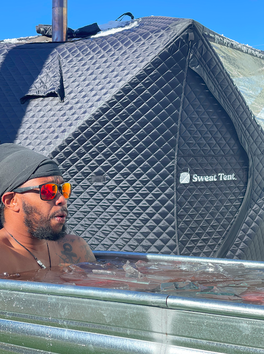|
We talk about strength being a skill, and how skills are BEST trained from a fresh & well-rested state…not something to be trained when fatigued…
Performing a 1RM Clean and Jerk, or “Explosivity” (**Think - Max height Box Jump), are examples of those types of skills. Similarly Absolute strength like a 1RM deadlift, is optimally trained at the beginning of your session, when you’re fresh. However, there’s another skill that is extremely important for Adventure Athletes, as well as Tactical Athletes, First responders, and anyone who needs to operate at their best, despite how fresh or fatigued they are. This skill is the ability to ACCESS your strength, balance, explosivity, etc… when you ARE in a state of fatigue. I call it, the ability to “Summon your Strength”.
0 Comments
It seems reasonable when you think about it.
Just try not to die for as long as you can. “Woohoo, I made it to 100!” There are whole industries built around this one topic. “20 min of Exercise, 3 times a week helps to reduce the risk of heart disease.” “Try this anti-aging routine!” “Try these brain games, so you don’t lose your mental acuity.” Even biohacking in the quest for “Longevity”, is really just prolonging death in disguise. “Do this simple trick to add years to your life.” “Sacrifice now, so you can have more days on this planet!” So that you can do, what exactly? Sit in the stress and anxiety of your job, or kids, or how it seems like the world is falling apart? Wallow in the depression around how hard and unfair life is?  By Ryan Humphries Co-Founder: Axistence *Caution* Strong Language :) If there’s anything I learned from Jeffrey (The Dude) Lebowski, it’s that “Nothing is fucked”. When most folks fall off the wagon, they think "the god-damned plane has crashed into the mountain!" When in reality, “Nothing is fucked dude”.  By Ryan Humphries Co-Owner: Axistence When the fellowship set out from Rivendell on their quest to destroy the one ring, their fitness was paramount. While they did indeed require a certain level of strength, what they needed more than anything was strength endurance (the ability to move forward despite feeling tired). While absolute strength is important (think testing your one-rep-max), you don’t want to train like that all year. In fact, if you want your training to be sustainable and you want to see continued results until your 111th birthday, you must have a little variation throughout the year.  By Ryan Humphries Co-Owner:Axistence Athletics The word "ADVENTURE" is defined as the following: "An unusual and exciting, typically hazardous experience or activity." Climbing Pico De Orizaba was exactly that. Rising 18’491 feet above sea level, it’s the highest peak in Mexico and the 3rd highest in North America. The trail starts at 14K’ and the journey begins at around midnight. For an asthmatic kid with three knee surgeries who’s experienced altitude sickness just about every time he’s been over 14,000 this was a bit of an ambitious goal. However, just because the adventure itself may be hazardous, doesn’t mean your training needs to be.  By Ryan Humphries: Co-Founder Axistence Athletics Why is it that every instagram influencer seems to be pushing ice baths and saunas?? Sure, they look cool, but what are the real benefits of these two things? What does the science say? Although you could nerd out on the decades worth of research on both of these, we thought we’d sum it up in a few bullet points. *Side note, if any of these claims seem too good to be true, you can find the studies in peer reviewed journals linked below . What about Calories??? Why did we wait until now to bring up Calories?
Lot’s of reasons. But mainly, because of despite what you might have heard…all calories are not created equal. “A calorie is a calorie”, a common refrain amongst fitness influencers and new to the industry personal trainers, just doesn’t hold up at a macro level (no pun intended). “But what about that study where the college professor ate a diet consisting of 100% Twinkies for 30 days and lost weight???” "The one thing you need to know about Carbs."By Dan Jimenez, Co-owner/Coach
If protein is the building block of muscle, What’s the deal with carbs? “Are they good?” “Are they bad?” Think of carbohydrates as fuel for activity When carbs are ingested, they are converted to sugar. That sugar is called, Glucose. "The most misunderstood Macro…Fat." By Dan Jimenez, Co-owner/Coach
“Fat is terrible for you.” “Fat makes you Fat.” “Fat causes heart disease.” Ummm.....No. This is FAKE NEWS. There were some extremely flawed studies done 70 years ago that have been disproven countless times since….but we tend to latch onto the first thing we learned, and it’s hard to shake (that’s called “anchoring bias”). “So, then what do I need to know about Fat? THE MOST CRITICAL MACRONUTRIENTBy Dan Jimenez, Co-owner/Coach
There is one critical macronutrient (Macro) to focus on whether you want Fat Loss, OR Muscle Gain. And…… it’s NOT Carbs! It’s like the “magic pill”, or “Pareto’s Principle” where 80% of your results will come from 20% of your efforts. Here it is... |
Our JournalOur coaches research and report on all things regarding fitness, adventure and the community within. Categories
All
|
Located in SE Denver1950 S. Quebec St.
Denver, CO 80231 Looking for a gym near Denver? We also serve Glendale, Aurora, Lowry, Virginia Village, Denver Tech Center, Cherry Creek, Indian Creek, Wash Park, Broadway, SOBO, and more.
|
|



 RSS Feed
RSS Feed





